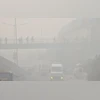Delhi is grappling with alarming air pollution levels, as the Air Quality Index (AQI) hit 348 on Friday, January 3, according to the central government’s Sameer App. Other cities in the National Capital Region (NCR) are also experiencing poor air quality, with AQI readings in Noida, Greater Noida, Ghaziabad, Gurugram, and Faridabad at 253, 291, 285, 252, and 214 respectively.
Within Delhi, localised AQI levels painted an even bleaker picture, with Ashok Vihar recording 366, ITO at 356, and South East Delhi at 371, all categorised as "very poor". The national capital began the week with a temporary improvement in air quality, shifting to the "moderate" category after heavy rainfall on Monday (January 1). However, this respite was short-lived, as the AQI deteriorated steadily, moving back into the "poor" category by Thursday.
Throughout 2024, Delhi recorded the highest number of "severe" AQI days since 2022, with 17 days exceeding an AQI of 400. Additionally, 70 days were classified as "very poor," highlighting the ongoing environmental and health crisis. Alarmingly, not a single "good" air quality day was recorded in 2024, a first since 2018.
Dense fog reduces visibility
Friday morning brought dense fog to Delhi, compounding the challenges posed by air pollution. Visibility was severely reduced, as thick fog shrouded major areas such as Akshardham, Lodhi Road, and Shankar Road. The India Meteorological Department (IMD) has forecasted that dense to very dense fog will persist over the weekend, with the national capital likely to experience a cold wave for the next few days.
The minimum temperature on Friday settled at 8.5 degrees Celsius, with the maximum expected to reach 20 degrees Celsius. The IMD also predicted light to moderate rainfall for Monday (January 6), which may bring some improvement in visibility and air quality. Meanwhile, the Delhi International Airport issued advisories warning passengers of potential flight delays due to low visibility conditions.
Also Read
Health precautions for residents
In light of the hazardous air quality, residents are advised to minimise outdoor activities, especially during early mornings and late evenings when pollution levels peak. Experts recommend using masks and air purifiers indoors and avoiding exposure in poorly ventilated areas. Prolonged exposure to polluted air can aggravate respiratory issues and pose significant health risks.
As Delhi continues to endure the dual challenges of air pollution and extreme weather conditions, urgent measures are needed to mitigate health risks and improve environmental conditions.
)